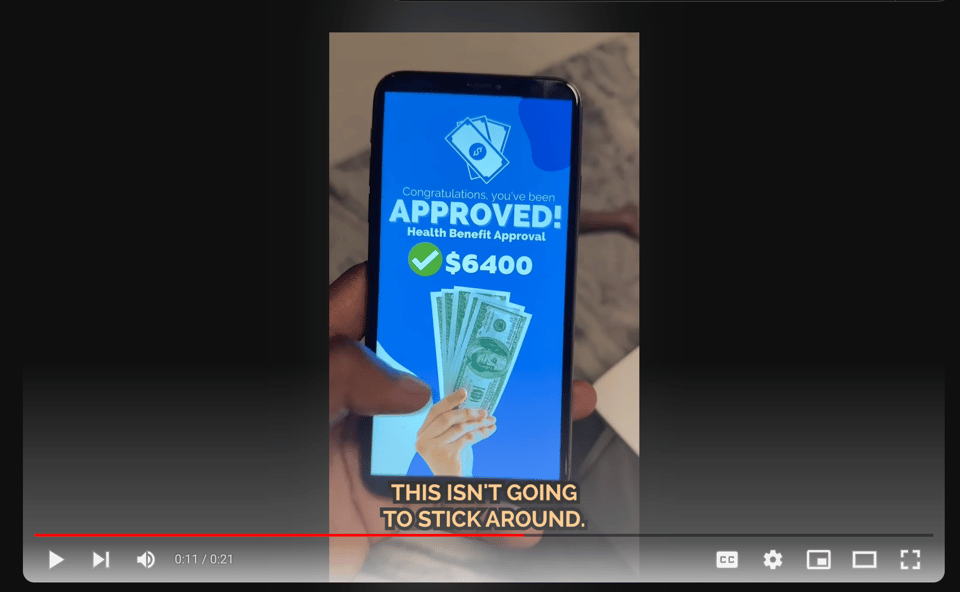Scam AI Deep Fakes are More Popular than that Katt Williams Interview

I never thought that a Jason Statham movie could give a fit of anxiety.
As a Black American of a certain age, actress Phylicia Rashad has been a part of my life as long as I can remember. Throughout my formative years, she played Clair Huxtable, the matriarch of the family on the Cosby Show, a staple in my house in its eight year run on NBC and for years longer in syndication. Rashad played a lawyer and mother of five children. She was quippy, patient, and stern when she needed to be. She reminded me of my mother and many of my friend’s moms.
Rashad is now in her mid-70s, an elder. But when she pops up in a film or on TV, in my head she’s still always playing a version of Clair Huxtable—my TV mom.
The next two paragraphs contain spoilers for the movie The Beekeeper—skip them if you need to.

Last weekend, Hope and I went to see The Beekeeper. It's the latest Jason Statham movie—a John Wick-esque revenge flick featuring a loner (who happens to be a retired assassin), working as a groundskeeper (and beekeeper) at the farmhouse owned by Mrs. Parker, played by Rashad. In the opening act of the film, Rashad becomes the victim of an online malware scam. The scammers, working from a massive call center, successfully drain her bank accounts, investment accounts, and get over $2 million dollars from a charity that Rashad helps operate. The scale of the scam is massive, raking in billions, and targeting seniors and other vulnerable people. In the film, Rashad’s character is so distraught that she takes her own life, setting the stage for my mini-panic and for Statham's John Wick-esque vengeance.
As someone who has an aging parent that is A. Extremely trusting, and B. Not the best with technology, I found myself pleading out loud “no, don’t give them your password!” But alas.
Fast forward to this Tuesday.
Each morning, I give my mother a call about 6:30 a.m. local time which is 6:30 p.m. in Tacoma, (except when it's not because of daylight saving). I get all the updates on her friends and medical appointments and we chat about how her great-grandchildren are doing in school. Tuesday, my mom casually mentioned that her “Medicare had expired” and she was having difficulty trying to renew it. My ears perked up immediately. Medicare doesn't expire! It's a government program! I was very confused and she seemed confused as well as she tried to explain it all to me.
In the end, it wasn't her Medicare that expired but some sort of supplemental coverage that my brother is helping her sort out. So we averted a disaster but the conversation freaked me out as I pictured my mother, like Rashad, putting all of her personal and financial information into a scammy website and getting taken to the cleaners.
Fast forward to Thursday.
Jason Koebler is a journalist and co-founder of 404 Media. He used to be with Vice and was the editor-in-chief of their tech offshoot, Motherboard. He, arguably more than any other journalist, has influenced my views on the internet, online security, and personal privacy. This week in 404 they reported on a massive YouTube scam targeting seniors. The scammers use AI generated celebrity “deep fake” videos to con people into applying for a non-existent government grant, usually in the neighborhood of 6400 USD (in some versions of the scam the amount is 16,800USD).
As Koebler explains, the videos go something like this:
“Hi guys, it’s Taylor Swift. Remember those stimulus checks? Well there’s a new thing going viral. The state is giving these $6,400 holiday packages to cover all your bills,” one of the ads, read by an AI voice clone of Taylor Swift, says. “It’s a holiday boost due to inflation, and you won’t need to pay it back. You’ll have so much leftover cash for rent, gas and groceries, you’ll be approved for your holiday stimulus as long as you don’t have Medicare or Medicaid. Just visit the website, answer two quick questions, and a representative will handle the rest, then you’ll get your stimulus package in like two or three days. I left the link below so you can claim yours too.”
Although 404 focused on the Swift example, I noted the selection of other celebrities used in the scam: Steve Harvey, Ice Cube, Will Smith, Oprah, and The Rock, among others, show they’re often targeting Black Americans.
Prior to 404’s reporting, YouTube was negligent with their response and according to 404 there are over 1,600 versions of the scam video posted across YouTube, with over 195 million cumulative views. For context, that’s nearly four times the number of views as the Katt Williams interview that broke the internet earlier this month.
Following Koebler’s reporting, some of the videos have been pulled but I was able to find others pretty easily this morning. The image below is a version of the scam featuring an AI generated version of Joe Rogan.

We live in a golden age of scams.
We are all inundated with calls from “American Benefits,” student debt relief, and extended car warranty scams. If you have elders in your life who you think might be susceptible, it’s worth having a conversation. The regulatory state has absolutely failed in this area and the emergence of cheap-as-hell generative AI is rocket fuel for scammers.
It reminds me of a discussion we had in World History this week about the deflationary nature of technology; it drives down costs and increases efficiency: a world made by hand, became a world made by water wheels, became a world made with steam power, became a world made by coal—each successive wave exponentially increasing outputs and bringing unexpected and unforeseen social ills. We're now on the precipice of a world made by AI and the same technology being used by these scammers is about to be unleashed on electorates around the world in 2024.
But I think I’ll save that for next week’s newsletter.
If you’ve encountered these scam videos or similar ones, I’d love to hear from you.